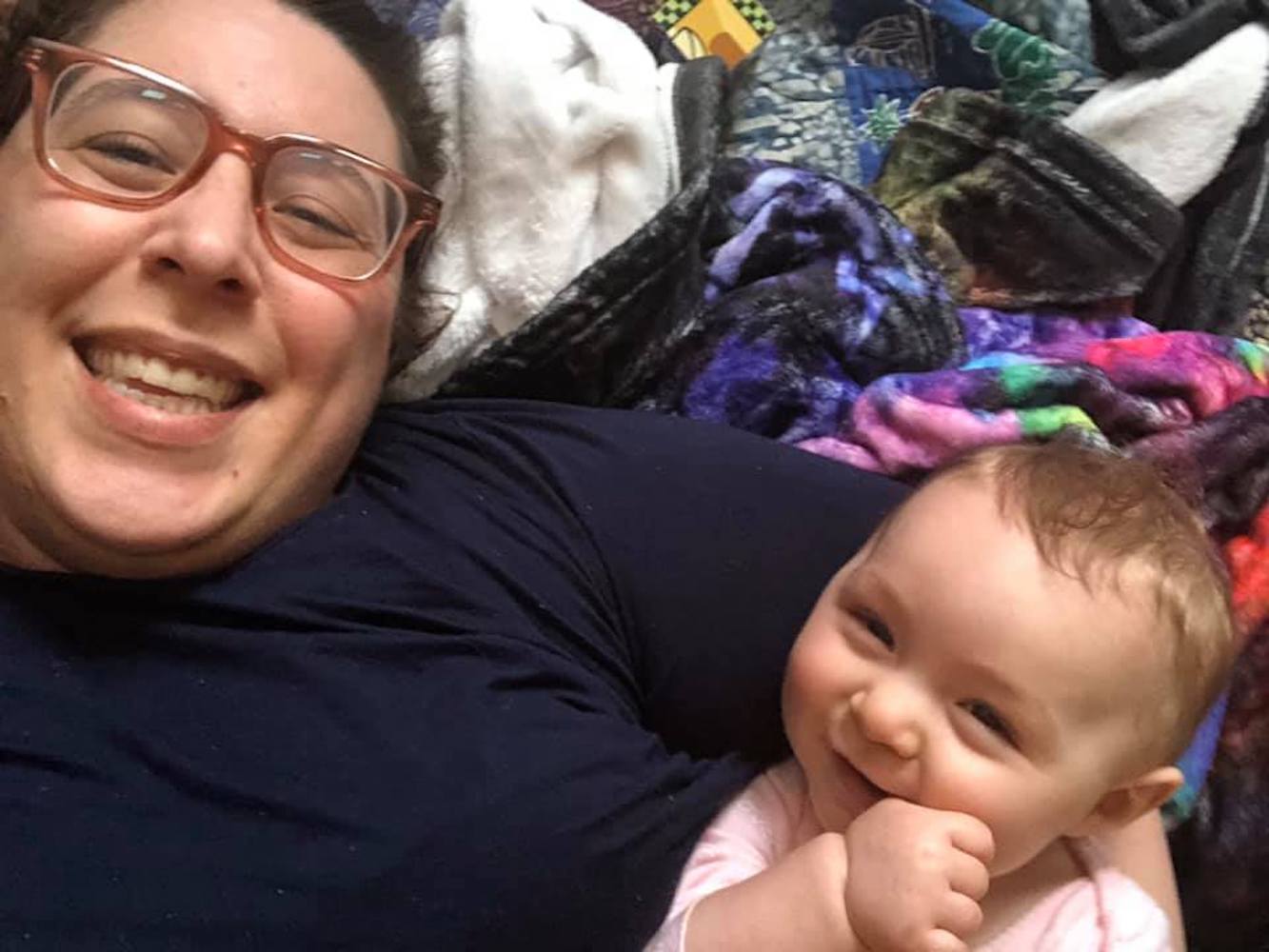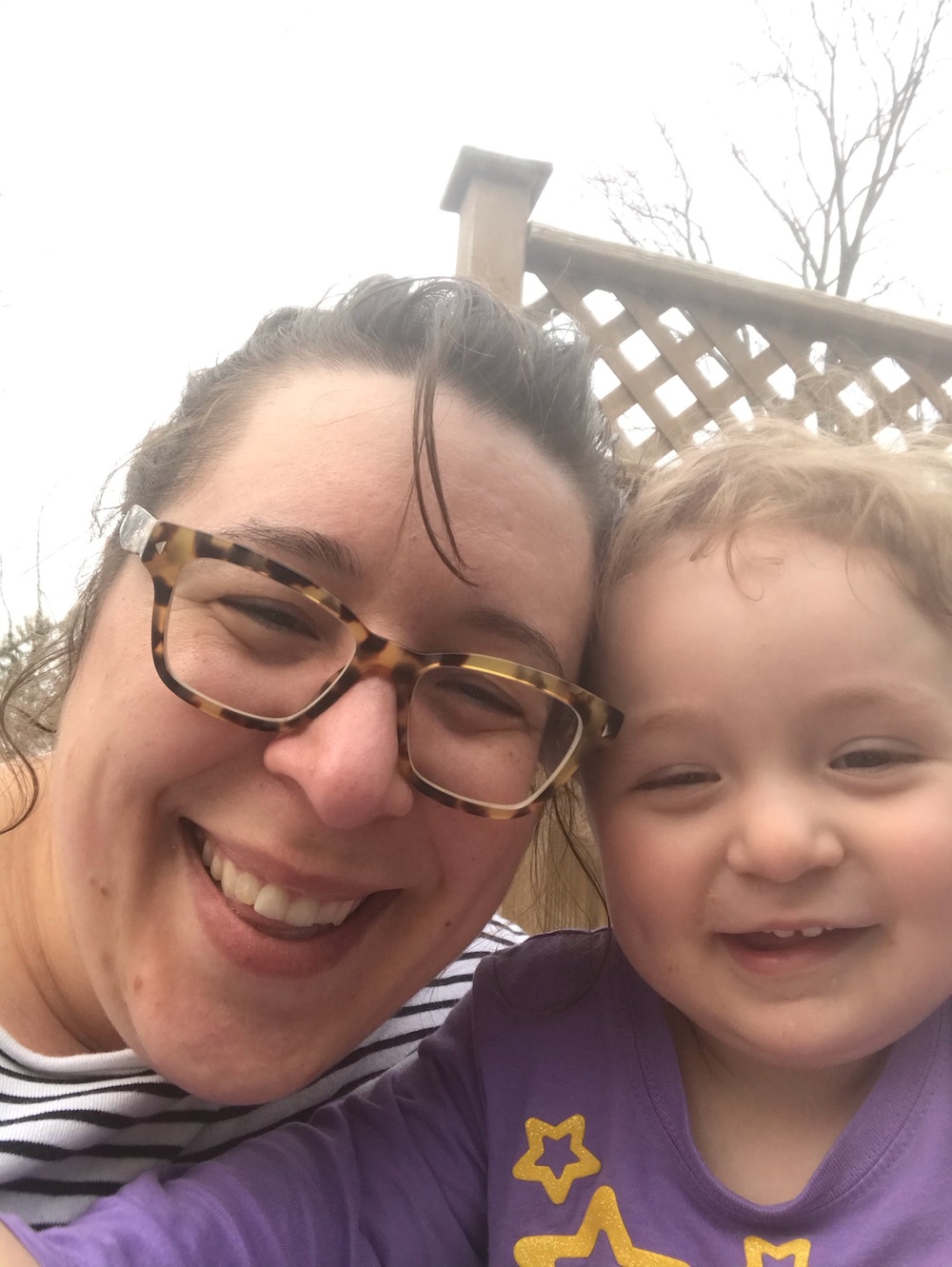
The day Lily was born, my husband, Joe, took pictures, murmured soft words, and held her every moment he could. "I want to stay home with her for her first year," he said. "I read it's important for their development."
Luckily, he was able to as he was honorably discharged from the Navy. But despite my three-month maternity leave, I wanted to go back to work.
But when we returned home from the hospital, I unraveled. No time to shower, eat, or pay a bill. Our lives revolved around Lily. Everything I imagined about motherhood exploded. Dreams of gardening with my daughter in a Snugli on my chest were replaced with her unrelenting cries and endless diaper changes.
Yet to Joe, she was just a baby. "What did you think having a baby would be like?" he asked.
"Not like this," I snapped, taking off my spit-up covered shirt and replacing it with a clean one.
It wasn't just the dirty shirt. I had thoughts of hurting myself and my baby, an alarming desire to drive us both off the road. I hated myself for these thoughts, but I hated her more. I hated that she never slept, and resented that I couldn't, either. I hated breastfeeding, which was not magical as I'd pictured, but painful and lonely.
I missed our date nights, coming and going as I pleased, and clean clothes.
Darkness settled over me, unlike any depression I'd experienced. I began experimenting with cutting myself just to feel something other than exhaustion, spending long minutes in the bathroom, my only escape. With each cut came relief from the burden of this new, agonizing life.
"You were in there a long time," Joe teased me.
Low spirited, I replied, "I wish I never had to come out."
He reached out to console me and saw the cuts on my arm. I didn't hide them. I didn't care. But Joe called his therapist, who told him about a clinic for women with postpartum depression.
"He doesn't even know me," I argued.
"You're going," a frazzled Joe said. "Today."
My First Dose of Postpartum Depression Treatment
We arrived to find a room filled with infants, dads, and moms, many of the latter red-faced and crying, while their husbands stood by, holding babies. I was amazed to see so many men like my husband, cradling their little ones, in solidarity with their wives, as the women went one by one to meet with a psychiatrist.
When it was my turn, I looked back at Joe and Lily. A concerned smile dusted his face. "We'll be right here when you're done."
During my intake, I asked flatly, "Will I ever love her?"
"This is a classic postpartum depression question. You will love her," the psychiatrist assured me. "But I have to ask, do you have any plans to kill yourself?"
Without hesitation, I said, "I want to drive off the road." Then I wept.
I wasn't allowed to drive until further notice, and if I didn't abide, the psychiatrist warned, "We'd have to consider hospitalization."
Joe ferried me to and from the clinic every day, no matter how many times he'd been up with Lily the night before. On weekends, Joe tended to me and to Lily, making sure we both ate and slept, as his parents flew out from Washington State to lend a hand, a relief to both of us.
For the first time, I felt some hope.
Every week, I attended weekly dialectical behavior therapy sessions (DBT), learning skills for coping with my anxiety and insomnia like radical acceptance and positive self-talk.
During my intake, I asked flatly, “Will I ever love her?”
Things Only Got Worse
Then, one night, after Joe put Lily to bed, we sat on our back porch, me with my usual glass of wine, him with his Coke and ice.
"Are you OK?" he asked, as I stared, glassy-eyed, into the trees.
Before coming outside, I'd already washed down a handful of Tylenols, along with sedatives and a few glasses of wine.
"I can't live like this anymore." I paused. "Lily deserves a mom, not me."
Joe sighed and said, "I'm calling the clinic's emergency line."
The therapist on duty advised Joe to bring me to the hospital immediately, even though I protested. But I had no choice. I confessed my desire to kill myself, so I could go voluntarily or in an ambulance.
Joe stayed with me for nine hours in the emergency room, until there was a bed ready in the psychiatric unit. His parents watched Lily at home.
"Please don't let them take me away," I called out to Joe, as a nurse led me to the unit.
"I'll see you in the morning," Joe answered back. "You will be OK."
When he arrived the next day, I pleaded with him to get me out.
"Someone tried to kill themselves last night," I cried. "I don't belong here."
"Can you give it a chance?" he begged.
I sat back in my chair and folded my arms. I resented Joe for bringing me here. At the beginning of our relationship, I'd been the strong one, helping him through his own hardships. But Lily changed everything.
"I have to get back," he said. "Focus on getting better, not getting out."
When Joe leaned in to give me a kiss goodbye, I stopped him. "I want a divorce when this is over," I whispered.
He teared up and said, "You've said some of the meanest things anyone has ever said to me."
I felt no remorse. Before the baby, we never went to bed angry. Now, I loathed him for keeping me here. I was determined to punish him, and I did, lashing out constantly, but he kept visiting and taking my phone calls. He never stopped trying.
I was discharged after five days. Joe and I argued for the entire ride home. When we arrived at the house, I imploded: "I can't take this anymore!"
I threw chairs and baby toys, wailing, and punching the wall. Joe couldn't calm me, so he took Lily and his parents to the farthest part of the house.
The next morning, Joe gave me a choice: "You either go to your parents' house and take a break, or you go back to the hospital."
I chose the first option.
A few days later, Joe called me. "I told my therapist what happened. He called Child Protective Services," he said matter-of-factly.
"They're going to take Lily away?" I asked.
Shocked, I suddenly realized how much I wanted her.

The Support I Needed
"I'm taking Lily to Washington to be with my family. I need help with Lily, and you need rest. We're not leaving you. Just promise me you'll stay with your parents and that you'll keep up with therapy and your medication," Joe said.
I promised, but I resented Joe for telling his therapist, and I resented his therapist for reporting me, for adding more stress to our already struggling family. But I moved in with my parents, keeping up with therapy, and taking a new cocktail of medication from a doctor who specialized in treating women with postpartum depression.
Every day, Joe and I FaceTimed.
Once I'd caught up on sleep, I surprised myself with the joy I felt in seeing Lily's rosy, heart-shaped face and gummy smile. I also loved seeing Joe, his brown curls framing his face, his thick black beard.
Over the phone, our new caseworker, Michelle, reassured me that her purpose was not to take my daughter but to be a resource. "I'm not a mom, but I see you're doing everything you can to get better," she said.
The only way I could know this for sure was to go to Washington and practice what I'd learned over time. "I want my family back," I told my therapist, the day before my flight. "For the first time, I feel like I could be her mom."
It had been six weeks since I'd seen my husband, my daughter. When I arrived at my in-laws, I found Joe babbling with Lily in the family room. "You want to hold her?" he asked.
I reached out. Lily smelled like lavender and diaper cream. I pressed my lips against her plump cheek, and she let out a joyous squeal. Joe reached out his arms and held us together.
Motherhood is both a storm and sigh, both of which I can now embrace with the help of ongoing treatment, including therapy, psychiatric wellness check-ins, and medication.
Looking Forward
My daughter is now 18 months old. I'd be lying if I said it's been easy, especially with the pandemic. Motherhood is both a storm and sigh, both of which I can now embrace with the help of ongoing treatment, including therapy, psychiatric wellness check-ins, and medication.
Joe and I have date nights again: cheese and crackers in our flannel pajamas and Netflix.
And when I feel the urge to escape, I watch my husband with our daughter, the way he talks to her, soft and tender, about putting together Legos or about how stars are formed.
I know he's talking to me, too.
And he gives me the kind of hope that lets me see the mother I've been all along.





